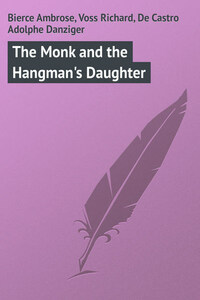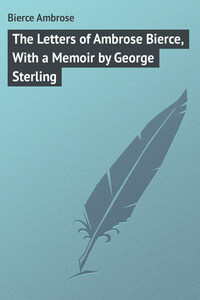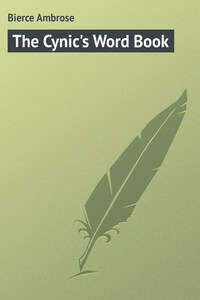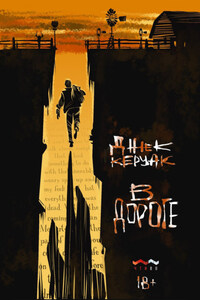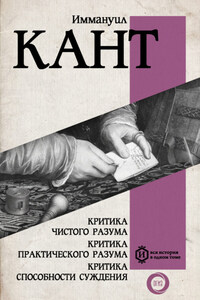Under the name of G. A. Danziger I wrote in the year 1889 a story founded on a German tale, which I called The Monk and the Hangman’s Daughter. The story was tragic but I gave it a happy ending. Submitting it to the late Ambrose Bierce, asking him to revise the story, he suggested the retention of the tragic part and so revised it. The story was published and the house failed.
When in 1900 a publisher desired to bring out the story provided I gave it a happy ending, I submitted the matter to Bierce and on August 21, 1900, he wrote me a long letter on the subject of which the following is an extract:
‘I have read twice and carefully, your proposed addition to The Monk, and you must permit me to speak plainly, if not altogether agreeably, of it. It will not do for these reasons and others:
‘The book is almost perfect as you wrote it; the part of the work that pleases me least is my part (underscores Bierce’s). I am surprised that you should yield to the schoolgirl desire for that shallowest of all literary devices, a “happy ending,” by which all the pathos of the book is effaced to “make a woman holiday.” It is unworthy of you. So much vii did I feel this unworthiness that I hesitated a long time before even deciding to have so much of “odious ingenuity” and “mystery” as your making Benedicta the daughter of the Saltmaster and inventing her secret love for Ambrosius instead of Rochus.
‘“Dramatic action,” which is no less necessary in a story than in a play, requires that so far as is possible what takes place shall be seen to take place, not related as having previously taken place… Compare Shakespeare’s Cymbeline with his better plays. See how he spoiled it the same way. You need not feel ashamed to err as Shakespeare erred. Indeed, you did better than he, for his explanations were of things already known to the reader, or spectator, of the play. Your explanations are needful to an understanding of the things explained; it is they that are needless. All “explanation” is unspeakably tedious, and is to be cut as short as possible. Far better to have nothing to explain – to show everything that occurs, in the very act of occurring. We cannot always do that, but we should come as near to doing it as we can. Anyhow, the “harking back” should not be done at the end of the book, when the dénouement is already known and the reader’s interest in the action exhausted…
‘Ambrosius and Benedicta are unique in letters. Their nobility, their simplicity, their sufferings – everything that is theirs stamps them as “beings apart.” They live in the memory sanctified and glorified by these qualities and sorrows. They are, in the last and most gracious sense, children of nature. Leave them lying there in the lovely valley of the gallows, where Ambrosius shuddered as his foot fell on the spot where he was destined to sleep…
‘Let The Monk and the Hangman’s Daughter alone. It is great work and you should live to see the world confess it. Let me know if my faith in your faith in me is an error. You once believed in my judgment; I think it is not yet impaired by age.
‘Sincerely yours,
‘(Signed) Ambrose Bierce.’
I can only add that my faith in Bierce’s judgment of letters is as firm to-day as it was then, when I gave him power of attorney to place my book with a publisher. This publisher embodied The Monk and the Hangman’s Daughter in Bierce’s collected works, then sold the right to Messrs. Albert and Charles Boni who without knowledge of the true facts brought out an edition under Bierce’s name.
1
On the first day of May in the year of our Blessed Lord 1680, the Franciscan monks Ægidius, Romanus and Ambrosius were sent by their Superior from the Christian city of Passau to the Monastery of Berchtesgaden, near Salzburg. I, Ambrosius, was the strongest and youngest of the three, being but twenty-one years of age.
The Monastery of Berchtesgaden was, we knew, in a wild and mountainous country, covered with dismal forests, which were infested with bears and evil spirits; and our hearts were filled with sadness to think what might become of us in so dreadful a place. But since it is Christian duty to obey the mandates of the Church, we did not complain, and were even glad to serve the wish of our beloved and revered Superior.
Having received the benediction, and prayed for the last time in the church of our Saint, we tied up our cowls, put new sandals on our feet, and set out, attended by the blessings of all. Although the way was long and perilous, we did not lose our hope, for hope is not only the beginning and the end of religion, but also the strength of youth and the support of age. Therefore our hearts soon forgot the sadness of parting, and rejoiced in the new and varying scenes that gave us our first real knowledge of the beauty of the earth as God has made it. The colour and brilliance of the air were like the garment of the Blessed Virgin; the sun shone like the Golden Heart of the Saviour, from which streameth light and life for all mankind; the dark blue canopy that hung above formed a grand and beautiful house of prayer, in which every blade of grass, every flower and living creature praised the glory of God.
